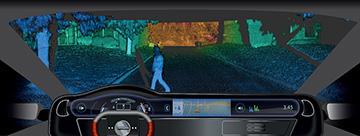
A Princeton Lightwave point-cloud demo. [Image: Princeton Lightwave] [Enlarge image]
Argo AI, a strategic partner of Ford Motor Company in the drive to develop production-ready autonomous vehicles, has announced its agreement to acquire Princeton Lightwave, a long-standing producer of lidar sensor technology based in Cranbury, N.J., USA. In a post on Medium announcing the deal, Argo’s CEO, Bryan Salesky, wrote that the acquisition would “accelerate our self-driving future,” and suggested that adding Princeton’s technology “will help us extend the range and resolution needed to achieve self-driving capability in challenging urban environments.”
Salesky’s enthusiasm stopped short of disclosing the price of the deal, which has not yet been made public.
Searching for a “full-stack” solution
Formed by Salesky, previously a key player in Google’s self-driving-vehicle effort, and Peter Rander, who led Uber’s autonomous-vehicle effort through autumn 2016, the Argo start-up burst onto the scene in February 2017, when the venture signed a five-year agreement for US$1 billion in strategic backing from Ford. The deal gave Ford a majority stake in Argo, which operates as a subsidiary of the automotive giant, albeit a highly independent one that styles itself as a “strategic collaborator” with Ford.
The Argo purchase in February, and now Argo’s purchase of Princeton Lightwave, represent individual mile markers in the effort by a number of large car-makers to develop “full-stack solutions” for self-driving cars. Such solutions comprise vertically integrated systems in which the auto maker owns the technology for the multiple sensors, AI, computation, mapping and other technical components underlying autonomous driving.
Indeed, Ford had previously, in 2016, already made a strategic co-investment (with the Chinese search firm Baidu) of US$75 million in another lidar developer, Velodyne; acquired the Israeli firm SAIPS, which produces computer-vision and machine-learning software; and provided seed funding to Civil Maps, which provides 3-D mapping software for the autonomous-vehicle market. Ford is on record (as of mid 2016) as targeting a Level 4 (“mind off”), fully autonomous vehicle by 2021.
Other car companies have been similarly active on the acquisition front; in early October, for example, General Motors acquired Strobe, a small lidar producer, and folded its engineering team into its existing Cruise Automation unit.
Princeton’s Geiger-mode sensors
Princeton Lightwave—featured in OPN’s Optics Innovations column in January 2016—has been in business since 2000. After the early-2000s telecom bust, however, the company reinvented itself into a specialist in InGaAs single-photon sensors built on avalanche photodiodes—and on those photodiodes’ behavior when operated in “Geiger mode,” beyond their breakdown voltage. The company built that business with support from DARPA, and carved out an early business as a defense contractor. More recently, it has tilted its development strongly toward the emergent autonomous-vehicle market.
Salesky, in his Medium post, struck a decidedly bullish note on Princeton Lightwave’s technology.
“With the addition of the Princeton Lightwave team, Argo is uniquely positioned to innovate in both sensor hardware and the interface between sensor and software — enabling us to achieve performance improvements that would not otherwise be possible,” he wrote. “Princeton Lightwave’s technology will help us unlock new capabilities that will aid our virtual driver system in handling object detection in challenging scenarios, such as poor weather conditions, and safely operating at high speeds in dynamic environments.”
